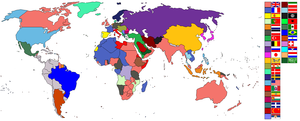Colonialism
| Human history and prehistory |
|---|
| ↑ before Homo (Pliocene) |
|
|
|
|
| see also: Modernity, Futurology |
| ↓Future |
Colonialism is the art of teaching foreigners how to do things right.[1] Colonialism became hugely popular after the 15th Century with White Europeans who wanted to export new products, such as typhoid, influenza, and syphilis to larger markets.
How colonialism works (DIY Guide)[edit]
Colonialism occurs when one nation exerts its sovereignty over another nation by means of superiority. More specifically, this image of superiority is usually impressed upon the indigenous population as much as possible. This is done in a number of ways[2]:
- Being taller than the indigenous peoples.
- Having a better haircut than them.
- Having better personal hygiene than them.
- Telling them to sit down.
- Being able talk/shout/scream over their opinions.
- Pretending they’re too stupid to have opinions.
- Having a gun (and/or waving it about a lot).
- Spreading rumours of the coloniser’s “enormous genitals”.
Steps 5 and 6 prove to be the most important to Colonisers since they are often impeded in their work by members of the indigenous population who are literate and can sometimes believe in such nonsensical ideas as ‘freedom’, ‘equality’, ‘self-determination’ etc. In his book on the subject[3] Henry Galsworthy recommends either shooting these people or giving them jobs as academics.
Types of colonialism[edit]
- Dependencies
Also known as the ‘Child-on-a-Leash’ Colony, a Dependency resembles a thirty year old computer programmer who still lives in his parent’s basement.
- Settler colony
Utilising the ‘Overstaying Your Welcome’ strategy, settlers enter a weaker nation’s borders, ask for a drink and begin scrutinising their CD collection.
- Plantation
In this version of Colonialism, the coloniser leaves off their children with another nation and never comes back.
Examples[edit]
America[edit]
Christopher Columbus whilst looking for a discreet invasion route to Australia in 1066 happened upon the coast of San Francisco which was inhabited by peacefull hippies and gays, and thus much easier to invade than Australia, which is notorious for its native criminal population. Although lacking the natural resources of australia (lager, mutton and kylie minogue), an outpost was set up, which grew into a thriving settlement.
Several religous extremists and fanatics were encouraged to move to the new land to stop bothing the native people of their homes of origin. After a short time, televangelism was created.
During a war with France, Britain let the colony become independent on the condition that it join their parent nation in the common loathing of France.
Australia[edit]
A circumnavigation of the globe race organised by magellan, captain cook and phileas fogg to be the first one to do ten laps and be home for supper, had an interesting mishap, cookes ship was abducted by a shoal of crabs and dumped on the coast of tasmania.
Cook, whose entire crew were retired prison wardens, decided to set up a penal colony where he had landed. This endeavor was vastly profitable, and created the foundations for a decent country.
Britain[edit]
After first being colonised by the Picts and Celts in an attempt to escape the Roman Empire, they were quickly thwarted, by the romans who invaded, built roads, and invented London, which is Latin for, a rod for your own back. This was shortly followed by an invasion of Vikings, and Saxons who carefully divided the country between themselves in organised knitting competitions. This state of affairs lasted for several centuries until it was decided by the French, who were and still are vastly inferior to any other nation, even holland, managed to send a fleet of fishing boats full of joan of arc, to destroy England. Much to their dismay they failed, but instead managed to conquer the kingdom.
Tibet[edit]
Tibet was claimed by the National Bank of China after the Dalai Llama (the offspring of an alpaca and Oprah) failed to keep up with his mortgage repayments.
Iraq[edit]
Formerly a province of Babylon, now a trading company of the united states of america, Iraq is famous for its vast wealth of freedom fighters, and people of strong belief and noble conviction. Second only to its sister country Saudi Arabia in prodicing enthusiastic, freelance activists, dedicated to the spread and upkeep of good old fashioned religious ethics, family values and beliefs.
India[edit]
The Europeans grew tired of their bland food and decided to seek out spices to liven things up. As all spicy food actually originated in India and what others call spicy is actually baby food in India, they sought out a sea route to India. The British, who are credited for having the most tasteless cuisine in the Solar System and the best jail food in the Milky Way, just had to get their hands on Indian spices. So they decided to try and colonize India. They tried for centuries to stop being pussies and digest real Indian food but they just could not let go of their pussiness. So they were forced to leave and set up their own curry restaurants at home, which real Indians don't even feed to babies.
Footnotes[edit]
Bibliography[edit]
- Pat Boon; The Secret Diaries; Utah Universiy Press 1965
- Nostrodamus; Me Thee and Dupree; Penguin, Kingston Upon Hull, 1255
- Time Life Magazine; BeachGirls edition; October 1997
See also[edit]
- Frenchmen (although they were never very good at it)
- British Empire
- Bastards
- Europeans
